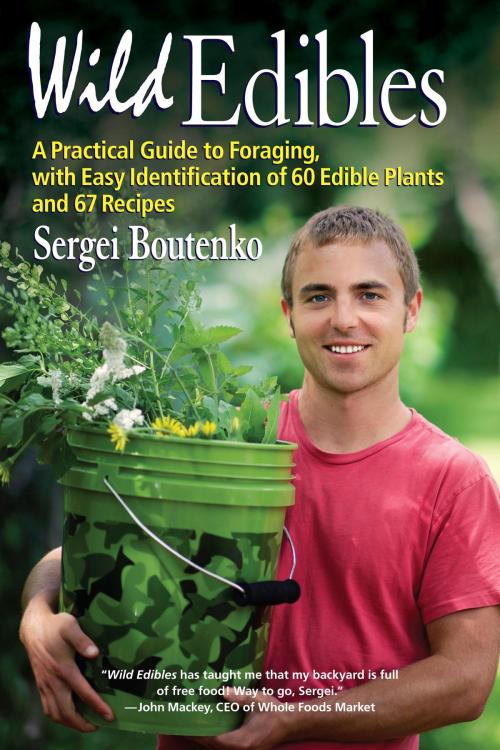Wild Edibles
A Practical Guide to Foraging, with Easy Identification of 60 Edible Plants and 67 Recipes
Nonfiction, Home & Garden, The Home, Biography & Memoir, Reference, Food & Drink| Author: | Sergei Boutenko | ISBN: | 9781583946275 |
| Publisher: | North Atlantic Books | Publication: | July 16, 2013 |
| Imprint: | North Atlantic Books | Language: | English |
| Author: | Sergei Boutenko |
| ISBN: | 9781583946275 |
| Publisher: | North Atlantic Books |
| Publication: | July 16, 2013 |
| Imprint: | North Atlantic Books |
| Language: | English |
In this field guide to foraging wild edible plants, Sergei Boutenko (son of raw-food guru Victoria Boutenko) explores the health benefits of wild-harvested food, explains how to safely identify trailside weeds, herbs, fruits, and greens that grow worldwide, and shares his delicious, nutrient-dense recipes.
Sergei Boutenko has been gathering wild plants since he was 13, when, early on in a 6-month hike from Mexico to Canada, he and his raw-food family ran out of provisions and turned to foraging for survival in the wild. Back in civilization, Boutenko was dismayed by the inferior quality of store-bought food and industrial agriculture, and began to regularly collect wild plants near his home and on his travels. Now, in Wild Edibles, he shares knowledge gleaned from years of live-food wildcrafting and thriving in harmony with nature.
This practical guide to plant foraging gives hikers, backpackers, raw foodists, gardeners, chefs, foodies, DIYers, survivalists, and off-the-grid enthusiasts the tools to identify, harvest, and prepare wild edible plants. The book outlines basic rules for safe wild-food foraging and discusses poisonous plants, plant identification protocol, gathering etiquette, and conservation.
Boutenko explores in detail the many rewards of eating wild flora: environmental protection, sustainability, saving money, economic self-sufficiency, and healthy living. He draws on thoroughly researched nutrition science to make a compelling case for the health benefits of a diverse, local-food diet that includes wild greens.
The majority of the 60 edible plants described in this field guide can be found worldwide, including common-growing trees. Over 300 color photos make plant identification easy and safe. A chapter containing 67 high-nutrient vegan recipes—including green smoothies, salads and salad dressings, spreads and crackers, main courses, juices, and sweets—provides inspiration to join Sergei on the trail to radiant health.
“Wild Edibles: A Practical Guide to Foraging, with Easy Identification of 60 Edible Plants and 67 Recipes has taught me that my backyard is full of free food! Way to go, Sergei.” —John Mackey, CEO of Whole Foods Market
In this field guide to foraging wild edible plants, Sergei Boutenko (son of raw-food guru Victoria Boutenko) explores the health benefits of wild-harvested food, explains how to safely identify trailside weeds, herbs, fruits, and greens that grow worldwide, and shares his delicious, nutrient-dense recipes.
Sergei Boutenko has been gathering wild plants since he was 13, when, early on in a 6-month hike from Mexico to Canada, he and his raw-food family ran out of provisions and turned to foraging for survival in the wild. Back in civilization, Boutenko was dismayed by the inferior quality of store-bought food and industrial agriculture, and began to regularly collect wild plants near his home and on his travels. Now, in Wild Edibles, he shares knowledge gleaned from years of live-food wildcrafting and thriving in harmony with nature.
This practical guide to plant foraging gives hikers, backpackers, raw foodists, gardeners, chefs, foodies, DIYers, survivalists, and off-the-grid enthusiasts the tools to identify, harvest, and prepare wild edible plants. The book outlines basic rules for safe wild-food foraging and discusses poisonous plants, plant identification protocol, gathering etiquette, and conservation.
Boutenko explores in detail the many rewards of eating wild flora: environmental protection, sustainability, saving money, economic self-sufficiency, and healthy living. He draws on thoroughly researched nutrition science to make a compelling case for the health benefits of a diverse, local-food diet that includes wild greens.
The majority of the 60 edible plants described in this field guide can be found worldwide, including common-growing trees. Over 300 color photos make plant identification easy and safe. A chapter containing 67 high-nutrient vegan recipes—including green smoothies, salads and salad dressings, spreads and crackers, main courses, juices, and sweets—provides inspiration to join Sergei on the trail to radiant health.
“Wild Edibles: A Practical Guide to Foraging, with Easy Identification of 60 Edible Plants and 67 Recipes has taught me that my backyard is full of free food! Way to go, Sergei.” —John Mackey, CEO of Whole Foods Market















